Racial Justice Research and Practice Dialogues 2020-23
The Office for Academic Affairs through its Office for the Advancement of Research, in collaboration with Undergraduate Studies and a faculty leadership committee representing Africana Studies (Jessica Gordon-Nembhard), Latinx Studies (José Luis Morín), and SEEK (Monika Son), sponsored a year-long community dialogue on racial justice research and scholarship across the disciplines. John Jay College faculty, students, and the broader community were invited to join four panel discussions and four hands-on workshops that invited a more in-depth discussion about changing the ways we teach and learn – specifically, by facilitating meaningful engagement with scholarship by and about people of color, and promoting the incorporation of research on structural inequities into curriculum college-wide. Over the course of the 2020-2021 academic year, events covered multi-dimensional topics including:
- racial disparities in health and mental health and trauma-informed pedagogy;
- the erasure of people of color from the historical narrative;
- economic inequality; and
- racism and discrimination in the criminal legal system.
Each panel was facilitated by a John Jay faculty member who also led a follow-up workshop intended to engage participants more deeply in the subject matter and promote best practices for cultivating racial justice in our classrooms and around the college. Each panel was recorded, and the recordings can be found below, as well as resource guides for further self-guided learning and curricular reform.
Series events, recordings and resources
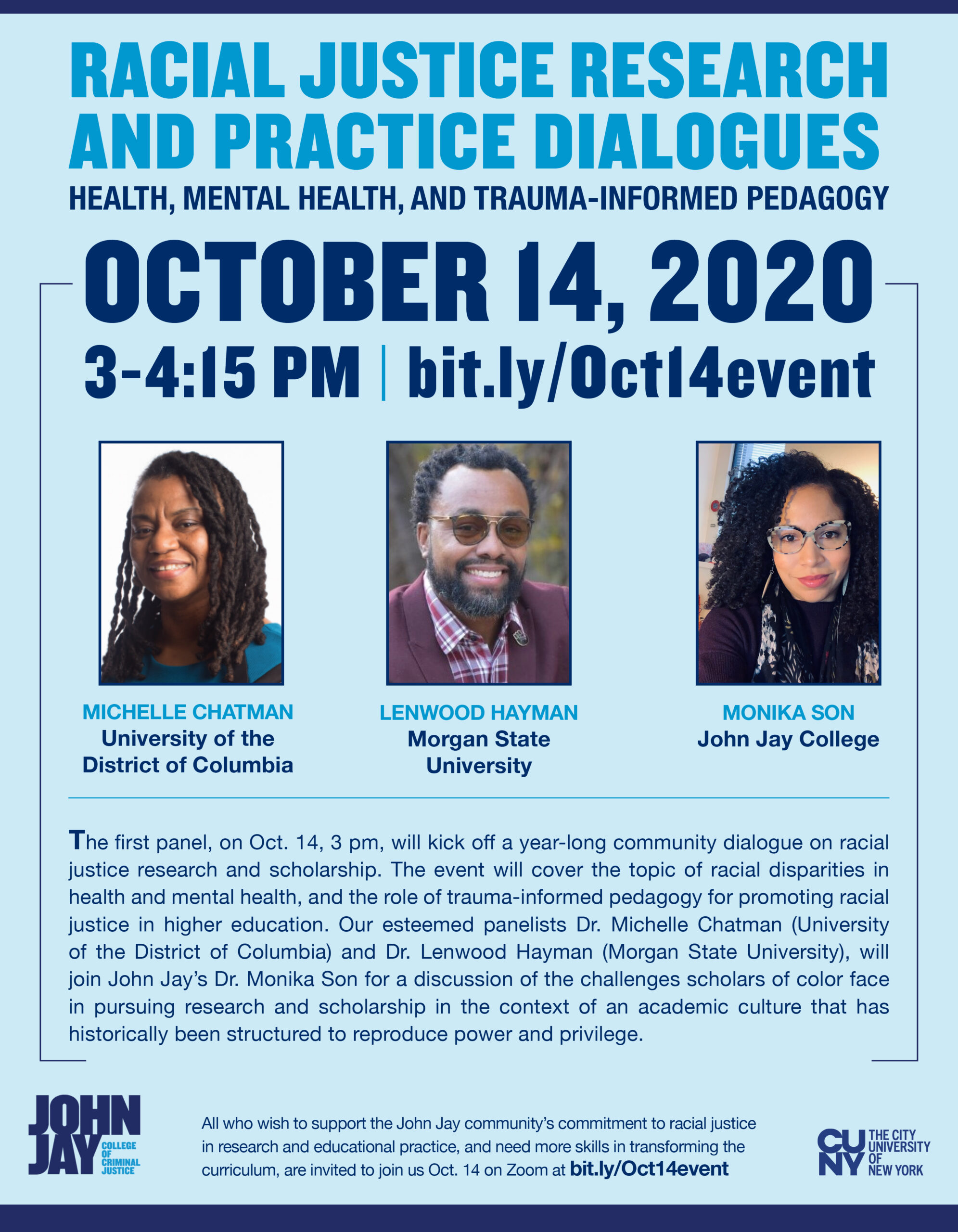 Event #1: Health, Mental Health, and Trauma-Informed Pedagogy
Event #1: Health, Mental Health, and Trauma-Informed Pedagogy
Panelists: Dr. Michelle Chatman (UDC) & Dr. Lenwood Hayman (Morgan State University)
Facilitator: Dr. Monika Son (JJC)
Event recording: https://youtu.be/NYTxARHOALw
Resources:
- Ayers, W., Ladson-Billings, G., & Michie, G. (2008). City kids, city schools: More reports from the front row. The New Press. Introduction, pgs 3-7.
- Chatman, MC. (2019). Advancing Black Youth Justice and Healing through Contemplative Practices and African Spiritual Wisdom. The Journal of Contemplative Inquiry, 6(1):27-46.
- Monzó, L. D., & SooHoo, S. (2014). Translating the academy: Learning the racialized languages of academia. Journal of Diversity in Higher Education, 7(3), 147–165. DOI: 10.1037/a0037400
- Yolanda Sealey-Ruiz, Arch of Self, LLC, https://www.yolandasealeyruiz.com/archaeology-of-self
For additional suggested readings, prompts for discussion, and curricular resources, download our full event guide: RJD Event 1.1 Homework and Readings.

Event #2: Race and Historical Narrative — Correcting the Erasure of People of Color
The second panel in the OAR/UGS Racial Justice Research and Practice Dialogues series, on November 11 at 3 pm, will shine a light on the erasure of people of color from the historical narrative commonly taught in the United States. This erasure is harmful to students of color in particular, as they do not see themselves represented in the stories told about this country, and actively harms people of all races by failing to present an accurate picture of the country’s founding and history.
Panelists: Dr. Paul Ortiz (UFL) & Dr. Suzanne Oboler (John Jay College)
Facilitator: Dr. Edward Paulino (John Jay College)
Event recording: https://youtu.be/WRIDHIA_a94
Resources: For suggested readings that may be helpful in placing the panel discussion in context, download the RJD Event 2.1 – Readings.
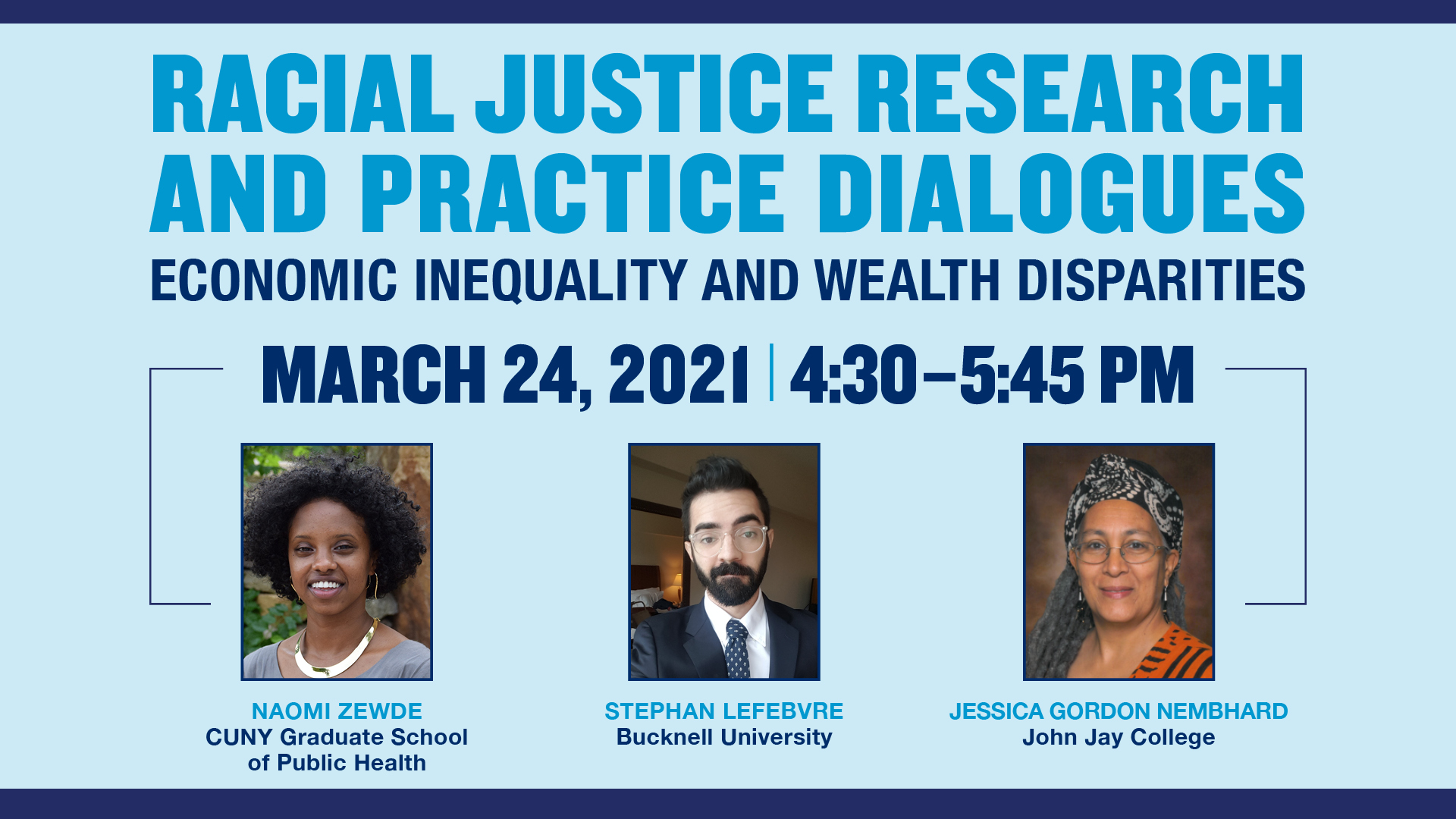
Event #3: Economic Inequality and Wealth Disparities
Panel Discussion – March 24, 2021, 4:30 – 5:45 pm
Panelists: Dr. Naomi Zewde (CUNY SPH) & Dr. Stephan Lefebvre (Bucknell University)
Facilitator: Dr. Jessica Gordon Nembhard (JJC)
Event Recording: https://youtu.be/_lp93i3EHqE
Resources: For suggested readings that may be helpful in placing the panel discussion in context, download the Racial Justice Dialogues – Economic Inequalities – Resources.
 Event #4: Racism in the Criminal Legal System
Event #4: Racism in the Criminal Legal System
Panel Discussion – April 21, 2021, 3 – 4:15 pm
Panelists: Dr. Jasmine Syedullah (Vassar College) & Professor César Cuauhtémoc García Hernández (University of Denver, Sturm College of Law)
Facilitator: Professor José Luis Morín (JJC)
Recording: https://youtu.be/OZ8N-c7Gob0
Resources: For suggested readings that may be helpful in placing the panel discussion in context, download the Racial Justice Dialogues – Resources – Racism in the Criminal Legal System
The series continued in academic year 2021-2022, expanding the scope of the discussions with panels on racial equity in disaster recovery.
 Event #5: Racial Equity in Community Recovery: CBOs, NGOs, and Government Collaboration
Event #5: Racial Equity in Community Recovery: CBOs, NGOs, and Government Collaboration
The fifth panel took place on November 1, 2021, and addressed the interdependent roles of government agencies, community-based and non-governmental organizations in promoting or hindering equitable outcomes in post-disaster situations. Panelists included Kim Burgo (Catholic Charities), Craig Fugate (One Concern), Dr. Jason Rivera (Buffalo State College), Dr. Warren Eller (John Jay College), and Dr. Dara Byrne (John Jay College). Find the recording at https://www.youtube.com/watch?v=LQkjxw6RcKg.
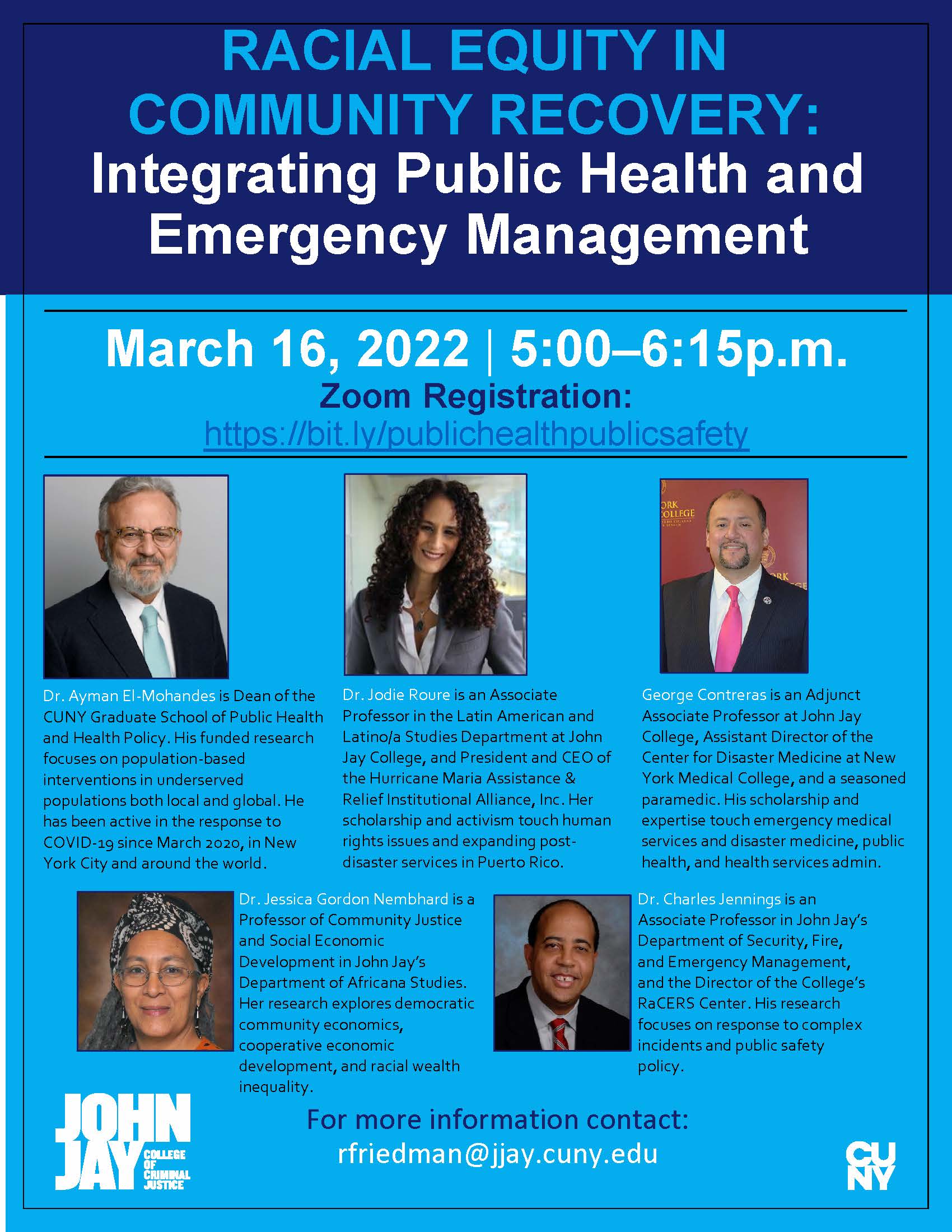 Event #6: Racial Equity in Community Recovery: Integrating Public Health and Emergency Management
Event #6: Racial Equity in Community Recovery: Integrating Public Health and Emergency Management
The sixth panel in the series, which took place on March 16, 2022, continued the theme of racial equity in disaster recovery. Panelists explored the overlapping roles of the institutions of public health and public safety in promoting equitable outcomes in post-disaster recovery, addressing the intersectional challenges faced by people of color and other marginalized communities. The conversation took special note of the particular context of post-COVID recovery. The participants were Dr. Ayman El-Mohandes (CUNY Graduate School of Public Health), Dr. Jodie Roure (John Jay College), and George Contreras (New York Medical College, John Jay College). The moderators were Dr. Jessica Gordon Nembhard and Dr. Charles Jennings (John Jay College). A full recording of the event is available at https://www.youtube.com/watch?v=4u9wUyjr5Sg&list=PL-B85PTQbdJj5UJhqiddjs1_9p90pZXTZ&index=6.
Resources:
- , 2020: COVID-19: A Barometer for Social Justice in New York City, American Journal of Public Health
- El-Mohandes, A., White, T.M., Wyka, K. et al. COVID-19 vaccine acceptance among adults in four major US metropolitan areas and nationwide. Sci Rep
- Roure, Jodie G. The Reemergence of Barriers During Crises and Natural Disasters: Gender-Based Violence Spikes Among Women and LGBTQ+ Persons During Confinement. Seton Hall Journal of Diplomacy and International Relations, pp 23-50, 2020.
- Jodie G. Roure, 2020 presentation: Children of Puerto Rico & COVID-19: At the Crossroads of Poverty & Disaster.
- Jodie G. Roure, Immigrant Women, Domestic Violence, and Hurricanes Irma and Maria in Puerto Rico: Compounding the Violence for the Most Vulnerable. The Georgetown Journal of Gender and the Law, 2019.
- Contreras GW, Burcescu B, Dang T, et al. Drawing parallels among past public health crises and COVID-19. Disaster Med Public Health Prep. doi: https://doi.org/10.1017/dmp.2021.202.
Victoria Bond’s ‘Zora and Me’ Trilogy Closes With ‘The Summoner’
Victoria Bond is a lecturer in John Jay College of Criminal Justice’s English Department, and the co-author with T. R. Simon of a series of young adult novels inspired by the childhood of American literary icon Zora Neale Hurston. The Zora and Me trilogy fictionalizes a young Zora as what The New York Times calls a “girl detective,” living in Hurston’s real-life hometown of Eatonville, Florida. Through the use of tropes from mystery and horror, the books explore community, and the fragility of justice for Black people.
In the first novel, Zora and Me, stories about a shape-shifter lead Zora and her best friend Carrie (the narrator) to solve a murder mystery. The second novel of the series, The Cursed Ground, sees Carrie and Zora learning more about the dark, unforgiveable history of slavery from a ghost. And in Bond’s latest and final novel, Zora and Me: The Summoner, Eatonville experiences upheaval that causes Zora’s family to seek their fortunes elsewhere. The use of zombies in this book, Bond says, is a way to explore the exploitation and trauma of African American lives.

Each installment of the trilogy may incorporate dark, scary elements, but, according to Kirkus Reviews, the brilliance of the novels is that they are able to render African American children’s lives during the Jim Crow era as “a time of wonder and imagination, while also attending to their harsh realities.”
Zora Neale Hurston was born in Alabama in 1891 and published several novels and many short stories, plays and essays, although she is best known for her classic Harlem Renaissance novel, Their Eyes Were Watching God. Zora and Me was the first novel not written by Hurston herself that has been endorsed by the Zora Neale Hurston Trust, founded in 2002. To bring the real Zora’s experiences in her hometown of Eatonville, Florida, to life, Bond and Simon researched Hurston’s life extensively by reading her biographies and her 1942 autobiography, Dust Tracks on a Road. They sought to create a story right for young adult readers that was true to the historical period in which it takes place, and which features a smart, spirited Black girl with a vivid imagination, ready to inspire other girls.
Zora and Me: The Summoner is forthcoming from Candlewick Press on October 13, 2020, and available for preorder now. To learn more about Zora Neale Hurston from author Vicky Bond, watch her in this short video on YouTube. Or to learn more about the experience of writing a novel during these uniquely difficult times, read this post from the author.
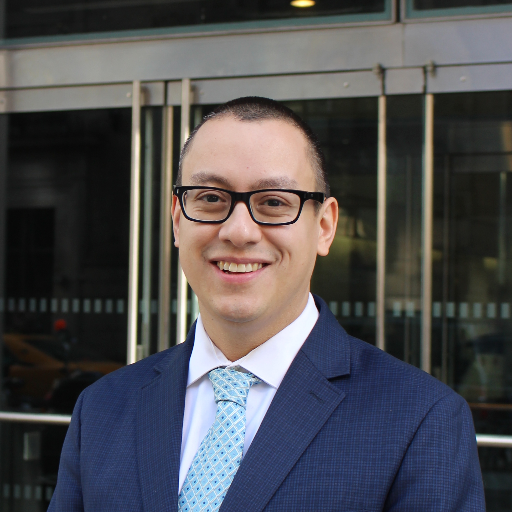 Eric Piza is an Associate Professor of Criminal Justice at John Jay College of Criminal Justice. His research focuses on the spatial analysis of crime patterns, problem-oriented policing, crime control technology, and the integration of academic research and police practice. His recent research has appeared in peer-reviewed journals including Criminology, Criminology & Public Policy, Crime & Delinquency, Journal of Quantitative Criminology, Justice Quarterly and more. In support of his research, Dr. Piza has secured over $2.2 million in outside research grants, including funding from the National Institute of Justice. In 2017, he was the recipient of the American Society of Criminology, Division of Policing’s Early Career Award in recognition of outstanding scholarly contributions to the field of policing.
Eric Piza is an Associate Professor of Criminal Justice at John Jay College of Criminal Justice. His research focuses on the spatial analysis of crime patterns, problem-oriented policing, crime control technology, and the integration of academic research and police practice. His recent research has appeared in peer-reviewed journals including Criminology, Criminology & Public Policy, Crime & Delinquency, Journal of Quantitative Criminology, Justice Quarterly and more. In support of his research, Dr. Piza has secured over $2.2 million in outside research grants, including funding from the National Institute of Justice. In 2017, he was the recipient of the American Society of Criminology, Division of Policing’s Early Career Award in recognition of outstanding scholarly contributions to the field of policing.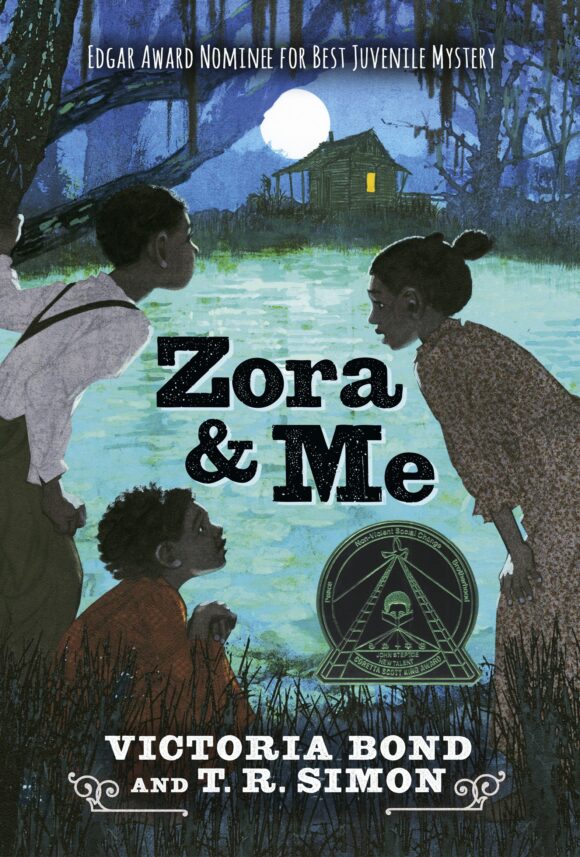
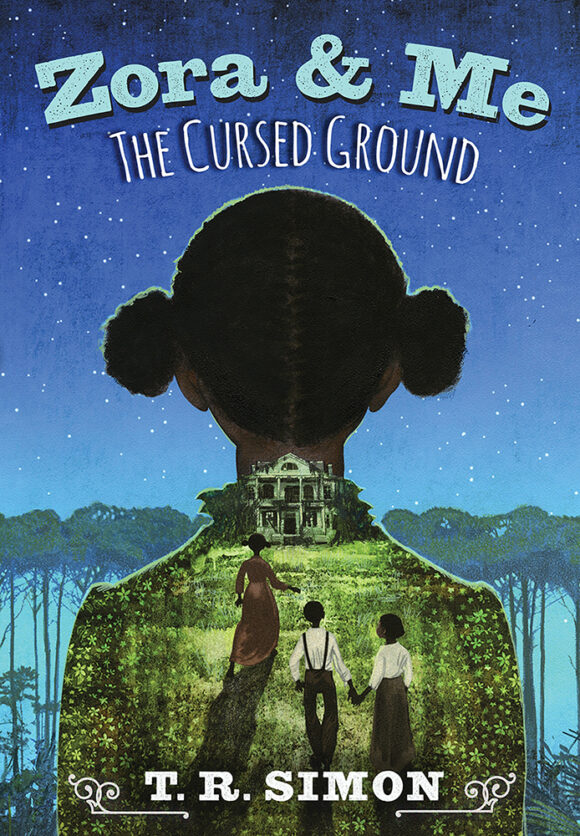
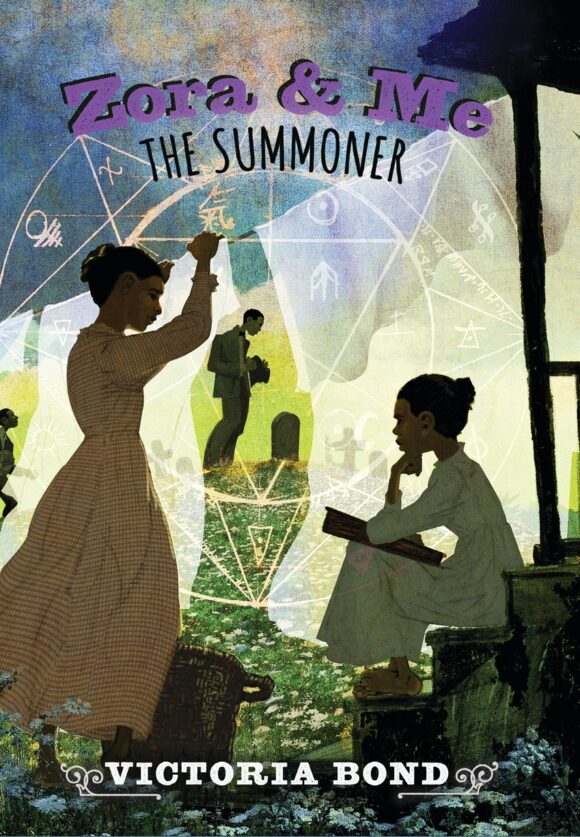



Recent Comments